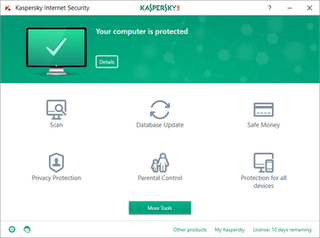Related Research Articles

In computer networking, a proxy server is a server application that acts as an intermediary between a client requesting a resource and the server providing that resource. It improves privacy, security, and possibly performance in the process.
In computer security, a DMZ or demilitarized zone is a physical or logical subnetwork that contains and exposes an organization's external-facing services to an untrusted, usually larger, network such as the Internet. The purpose of a DMZ is to add an additional layer of security to an organization's local area network (LAN): an external network node can access only what is exposed in the DMZ, while the rest of the organization's network is protected behind a firewall. The DMZ functions as a small, isolated network positioned between the Internet and the private network.

Nmap is a network scanner created by Gordon Lyon. Nmap is used to discover hosts and services on a computer network by sending packets and analyzing the responses.

A personal firewall is an application which controls network traffic to and from a computer, permitting or denying communications based on a security policy. Typically it works as an application layer firewall.
Network security are security controls, policies, processes and practices adopted to prevent, detect and monitor unauthorized access, misuse, modification, or denial of a computer network and network-accessible resources. Network security involves the authorization of access to data in a network, which is controlled by the network administrator. Users choose or are assigned an ID and password or other authenticating information that allows them access to information and programs within their authority. Network security covers a variety of computer networks, both public and private, that are used in everyday jobs: conducting transactions and communications among businesses, government agencies and individuals. Networks can be private, such as within a company, and others which might be open to public access. Network security is involved in organizations, enterprises, and other types of institutions. It does as its title explains: it secures the network, as well as protecting and overseeing operations being done. The most common and simple way of protecting a network resource is by assigning it a unique name and a corresponding password.
Internet security is a branch of computer security. It encompasses the Internet, browser security, web site security, and network security as it applies to other applications or operating systems as a whole. Its objective is to establish rules and measures to use against attacks over the Internet. The Internet is an inherently insecure channel for information exchange, with high risk of intrusion or fraud, such as phishing, online viruses, trojans, ransomware and worms.
In computer networking, port knocking is a method of externally opening ports on a firewall by generating a connection attempt on a set of prespecified closed ports. Once a correct sequence of connection attempts is received, the firewall rules are dynamically modified to allow the host which sent the connection attempts to connect over specific port(s). A variant called single packet authorization (SPA) exists, where only a single "knock" is needed, consisting of an encrypted packet.

AVG AntiVirus is a line of antivirus software developed by AVG Technologies, a subsidiary of Avast, a part of Gen Digital. It is available for Windows, macOS and Android.

Steven M. Gibson is an American software engineer, security researcher, and IT security proponent. In the early 1980s, he worked on light pen technology for use with Apple and Atari systems, and in 1985, founded Gibson Research Corporation, best known for its SpinRite software. He is also known for his work on the Security Now podcast.

Microsoft Defender Antivirus is an antivirus software component of Microsoft Windows. It was first released as a downloadable free anti-spyware program for Windows XP and was shipped with Windows Vista and Windows 7. It has evolved into a full antivirus program, replacing Microsoft Security Essentials in Windows 8 or later versions.
Norton Internet Security, developed by Symantec Corporation, is a discontinued computer program that provides malware protection and removal during a subscription period. It uses signatures and heuristics to identify viruses. Other features include a personal firewall, email spam filtering, and phishing protection. With the release of the 2015 line in summer 2014, Symantec officially retired Norton Internet Security after 14 years as the chief Norton product. It was superseded by Norton Security, a rechristened adaptation of the original Norton 360 security suite. The suite was once again rebranded to Norton 360 in 2019.
Defensive computing is a form of practice for computer users to help reduce the risk of computing problems, by avoiding dangerous computing practices. The primary goal of this method of computing is to be able to anticipate and prepare for potentially problematic situations prior to their occurrence, despite any adverse conditions of a computer system or any mistakes made by other users. This can be achieved through adherence to a variety of general guidelines, as well as the practice of specific computing techniques.

An idle scan is a TCP port scan method for determining what services are open on a target computer without leaving traces pointing back at oneself. This is accomplished by using packet spoofing to impersonate another computer so that the target believes it's being accessed by the zombie. The target will respond in different ways depending on whether the port is open, which can in turn be detected by querying the zombie.

Kaspersky Internet Security is a internet security suite developed by Kaspersky Lab compatible with Microsoft Windows and Mac OS X. Kaspersky Internet Security offers protection from malware, as well as email spam, phishing and hacking attempts, and data leaks. Kaspersky Lab Diagnostics results are distributed to relevant developers through the MIT License.
In computing, a firewall is a network security system that monitors and controls incoming and outgoing network traffic based on configurable security rules. A firewall typically establishes a barrier between a trusted network and an untrusted network, such as the Internet, or between several VLANs.

Comodo Dragon is a freeware web browser. It is based on Chromium and is produced by Comodo Group. Sporting a similar interface to Google Chrome, Dragon does not implement Chrome's user tracking and some other potentially privacy-compromising features, replacing them with its own user tracking implementations, and provides additional security measures, such as indicating the authenticity and relative strength of a website's Secure Sockets Layer (SSL) certificate.
Avira Operations GmbH & Co. KG is a German multinational computer security software company mainly known for its Avira Free Security antivirus software. Although founded in 2006, the Avira antivirus application has been under active development since 1986 through its predecessor company H+BEDV Datentechnik GmbH. Since 2021, Avira has been owned by American software company NortonLifeLock, which also operates Norton, Avast and AVG. It was previously owned by investment firm Investcorp.

Heartbleed is a security bug in some outdated versions of the OpenSSL cryptography library, which is a widely used implementation of the Transport Layer Security (TLS) protocol. It was introduced into the software in 2012 and publicly disclosed in April 2014. Heartbleed could be exploited regardless of whether the vulnerable OpenSSL instance is running as a TLS server or client. It resulted from improper input validation in the implementation of the TLS heartbeat extension. Thus, the bug's name derived from heartbeat. The vulnerability was classified as a buffer over-read, a situation where more data can be read than should be allowed.
Mirai is malware that turns networked devices running Linux into remotely controlled bots that can be used as part of a botnet in large-scale network attacks. It primarily targets online consumer devices such as IP cameras and home routers. The Mirai botnet was first found in August 2016 by MalwareMustDie, a white hat malware research group, and has been used in some of the largest and most disruptive distributed denial of service (DDoS) attacks, including an attack on 20 September 2016 on computer security journalist Brian Krebs' website, an attack on French web host OVH, and the October 2016 DDoS attacks on Dyn. According to a chat log between Anna-senpai and Robert Coelho, Mirai was named after the 2011 TV anime series Mirai Nikki.
Data center security is the set of policies, precautions and practices adopted at a data center to avoid unauthorized access and manipulation of its resources. The data center houses the enterprise applications and data, hence why providing a proper security system is critical. Denial of service (DoS), theft of confidential information, data alteration, and data loss are some of the common security problems afflicting data center environments.
References
- 1 2 Ho, Erica (April 7, 2010). "ShieldsUP Tests Your Firewall for Vulnerabilities". Lifehacker . Retrieved December 13, 2018.
- ↑ Horowitz, Michael (January 27, 2014). "How and why to check port 32764 on your router". Computerworld . Retrieved December 13, 2018.
- ↑ Ellison, Craig (March 15, 2006). "For Home Networkers". PC Magazine . Retrieved December 13, 2018.
- ↑ O'Donnell, Andy (October 24, 2018). "How to Test Your Firewall". Lifewire . Retrieved December 13, 2018.
- ↑ Gibson, Steve. "ShieldsUP! — Internet Vulnerability Profiling". Gibson Research Corporation . Retrieved December 13, 2018.